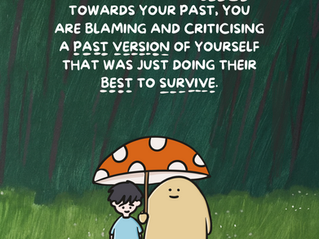WORKSHEET: A 40 values checklist activity.
- Hernping
- Jan 27, 2023
- 3 min read
Updated: Mar 22, 2023
And why you need to identify your values.

Values vs Goals and Outcomes.
Identifying and living true to your values is one of the major components of Acceptance and Commitment Therapy (ACT), and I've seen first-hand how a shift in mindset from outcome-focus to value-focus can help us become happier, feel more fulfilled and heal as well.
However, for most of us, we've been trained to think from a young age in terms of outcomes and goals, – yes, they’re necessary sometimes but with goals it's always a question of "What's next?"
And when that's been reached, we feel a brief moment of happiness and achievement, but find ourselves asking yet again "What's next"?
I'm sure you know it too, while it can be motivating at time, it can also be absolutely exhausting.
As Russ Harris, author of a number of books on ACT and The Happiness Trap, says “if you’re living a goal-focused life, then no matter what you have, it’s never enough.”
Values on the other hand are your heart's deepest desires for how you want to behave as a human being.
They are not about what you want to get or achieve, but how you'd like to act on an ongoing basis, that makes you feel like you're really living true to being "you".
It's a powerful shift in mindset - to bring happiness to you each and everyday, instead of only experiencing momentary happiness when you feel like you've "achieved" something in your life.
The scientific benefits of living true to your Values.
According to Barb Markway and Celia Ampel, values “are the principles that give our lives meaning and allow us to persevere through adversity.” When we are living in alignment with our values we often find that:
Our stress levels reduce – research has shown knowing and being able to hold onto our own inner compass (set of values) when faced with a stressful situation allows us to let go of things that don’t matter.
Decisions are easier to make – we can reflect the ‘why’ behind our choices and being able to problem-solve based on our core values, rather than getting tied up in knots in the details of the options.
It helps support our motivation or willpower to stick at difficult tasks – whilst willpower is a vague and wishy-washy term, our ‘why’ is the thing that keeps us keeping on. That ‘why’ is (or at least should be) firmly rooted in our values.
Essentially, living a values-aligned life allows us to make different choices – about our work, who we work for, what we do, who we choose to spend our time with, even what brands we spend our money with. Sometimes when people describe an inner tension, a strong discomfort in their lives it has its messy routes in not having, knowing or living by their values.
The Activity - the Values Checklist (Russ Harris).
In the worksheet below, you'll find a short-list of the most common values for people.
Here's what you have to do.
Find your TOP THREE values among these three pillar below:
Your personal life - for leisure, for enjoyment, for meaning
Your relationships - what kind of friend, partner, loved one would you like to be?
Your career - what behaviours and actions at work would make you feel good about yourself?
Let me know how you go okay?
Take care,
Hernping
.jpg)
























